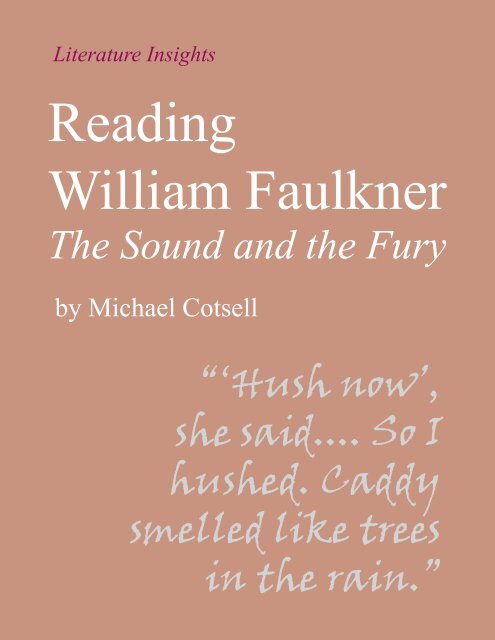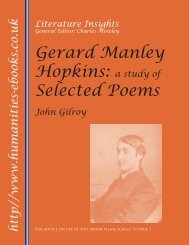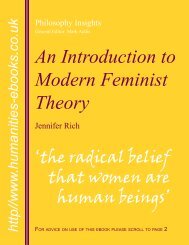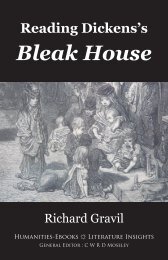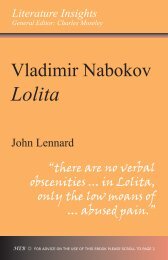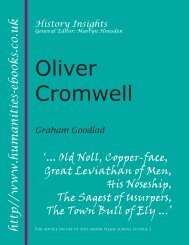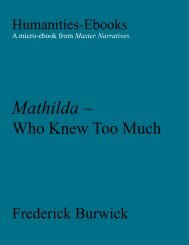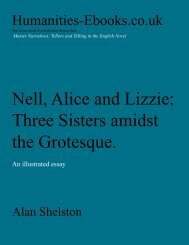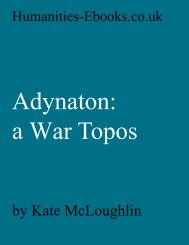The Sound and the Fury - Humanities-Ebooks
The Sound and the Fury - Humanities-Ebooks
The Sound and the Fury - Humanities-Ebooks
Create successful ePaper yourself
Turn your PDF publications into a flip-book with our unique Google optimized e-Paper software.
Running Head 1<br />
Literature Insights<br />
Reading<br />
William Faulkner<br />
<strong>The</strong> <strong>Sound</strong> <strong>and</strong> <strong>the</strong> <strong>Fury</strong><br />
by Michael Cotsell<br />
“‘Hush now’,<br />
she said.... So I<br />
hushed. Caddy<br />
smelled like trees<br />
in <strong>the</strong> rain.”
Reading William Faulkner<br />
<strong>The</strong> <strong>Sound</strong> <strong>and</strong> <strong>the</strong> <strong>Fury</strong><br />
Michael Cotsell<br />
Literature Insights ☼ <strong>Humanities</strong>-<strong>Ebooks</strong>
Publication Data<br />
© Michael Cotsell, 2008<br />
<strong>The</strong> Author has asserted his right to be identified as <strong>the</strong> author of this Work in accordance<br />
with <strong>the</strong> Copyright, Designs <strong>and</strong> Patents Act 1988.<br />
Published by <strong>Humanities</strong>-<strong>Ebooks</strong> LLP, Penrith CA10 2JE<br />
ISBN 978-1-84760-055-4 PDF<br />
ISBN 978-1-84760-206-0 ePub
Contents<br />
A Note on <strong>the</strong> Author<br />
Preface <strong>and</strong> Acknowledgements<br />
Chapter 1: An Introduction to Faulkner’s Life <strong>and</strong> Work<br />
1. 1 ‘Yoknapatawpha County’<br />
1.2 Early Fiction<br />
1.3 <strong>The</strong> Chronicles<br />
1.4 Novels of Contemporary Life<br />
1.5 <strong>The</strong> ‘Commitment’ Writings<br />
1.6 <strong>The</strong> Composition of <strong>The</strong> <strong>Sound</strong> <strong>and</strong> <strong>the</strong> <strong>Fury</strong><br />
1.7 <strong>The</strong> ‘Dark House’<br />
1.8 Introduction to <strong>the</strong> form of <strong>The</strong> <strong>Sound</strong> <strong>and</strong> <strong>the</strong> <strong>Fury</strong><br />
1.9 Summary of <strong>the</strong> sections<br />
1.10 Race in <strong>The</strong> <strong>Sound</strong> <strong>and</strong> <strong>the</strong> <strong>Fury</strong><br />
Chapter 2: Contexts<br />
2.1 <strong>The</strong> South<br />
2.2. Oxford<br />
2.3 Sou<strong>the</strong>rn Religion<br />
2.4. Views of <strong>the</strong> South by Sou<strong>the</strong>rners<br />
2.5 <strong>The</strong> Falkners<br />
2.6 Literary Influences before Modernism<br />
Chapter 3: Faulkner <strong>and</strong> Modernism<br />
3.1 Modernism at ‘Ole Miss’’ <strong>and</strong> in New Orleans<br />
3.2 Predecessors to <strong>the</strong> Modernist Novel<br />
3.3 New York 1920–21<br />
3.4 Faulkner <strong>and</strong> <strong>the</strong> ‘Lost Generation’<br />
3.5 France 1925–6<br />
3.6 Modernist Influences: Philosophy <strong>and</strong> Psychology
Chapter 4: Reading <strong>The</strong> <strong>Sound</strong> <strong>and</strong> <strong>the</strong> <strong>Fury</strong><br />
4.1 Reading <strong>the</strong> title<br />
4.2 <strong>The</strong> Idiot’s Tale<br />
4.3 <strong>The</strong> Suicide’s Tale<br />
4.4 <strong>The</strong> Nasty Boy’s Tale<br />
4.5 (Who) Is Caddy?<br />
4.6 <strong>The</strong> Racist’s Tale?<br />
Appendix I: Faulkner’s Commentaries on <strong>The</strong> <strong>Sound</strong> <strong>and</strong> <strong>the</strong> <strong>Fury</strong><br />
A Short Bibliography<br />
Glossary of Psychological Terms<br />
<strong>The</strong> <strong>Sound</strong> <strong>and</strong> <strong>the</strong> <strong>Fury</strong> 5
A Note on <strong>the</strong> Author<br />
Dr. Michael Cotsell is an Associate Professor in <strong>the</strong> English Department at <strong>the</strong> University<br />
of Delaware. He was <strong>the</strong> one time Associate Editor of <strong>the</strong> Dickens Companions<br />
series to which he contributed <strong>The</strong> Companion to ‘Our Mutual Friend’ (Edinburgh<br />
University press, 1986) <strong>and</strong> <strong>the</strong> General Editor of <strong>the</strong> Series English Literature<br />
<strong>and</strong> <strong>the</strong> Wider World for which he edited <strong>the</strong> volume Creditable Warriors: English<br />
Literature <strong>and</strong> <strong>the</strong> Wider World, 1830–76 (Ashfield Press,1990). He has edited <strong>the</strong><br />
World’s Classics edition of Our Mutual Friend <strong>and</strong> volumes of critical essays on<br />
Great Expectations <strong>and</strong> A Tale of Two Cities <strong>and</strong> is <strong>the</strong> author of Barbara Pym (Mac-<br />
Millan, 1989).<br />
Dr. Cotsell’s most recent book is <strong>The</strong> <strong>The</strong>ater of Trauma: American Modernist<br />
Drama <strong>and</strong> <strong>the</strong> Psychological Struggle for <strong>the</strong> American Mind, 1900–1930 (Peter<br />
Lang, 2005). He continues to work on psychiatry <strong>and</strong> American Modernism.
Preface <strong>and</strong> Acknowledgements<br />
This study is for Rachel Eliza Griffiths.<br />
This study is intended for first-time readers of <strong>The</strong> <strong>Sound</strong> <strong>and</strong> <strong>the</strong> <strong>Fury</strong> <strong>and</strong>—since it<br />
offers new scholarship <strong>and</strong> critical argument on Faulkner—for established critics <strong>and</strong><br />
scholars. Unlike <strong>the</strong> many ‘Guides to’ <strong>and</strong> ‘Notes on’ Faulkner’s novel on <strong>the</strong> market,<br />
this study aims to be accessible without simplification.<br />
Chapter 1 provides some general context about Faulkner’s life <strong>and</strong> work. It also<br />
includes a brief introduction to <strong>the</strong> form <strong>and</strong> style of Faulkner’s novel <strong>and</strong> summaries<br />
of <strong>the</strong> novel’s four narratives. <strong>The</strong> first-time reader may want to begin with <strong>the</strong> summaries<br />
(Chapter 1.9). Chapter 2 provides a discussion of <strong>the</strong> contexts of Sou<strong>the</strong>rn<br />
history <strong>and</strong> Faulkner’s family history. Chapter 3 is a discussion of <strong>the</strong> influences<br />
on Faulkner of Modernist literature <strong>and</strong> Modernist psychology <strong>and</strong> philosophy. It is<br />
impossible to discuss Faulkner adequately without being drawn into psychological<br />
<strong>the</strong>ories—he is an intensely psychological novelist who lived in intensely psychological<br />
times. To help you a brief ‘Glossary of Psychological Terms’ is provided at<br />
<strong>the</strong> end of <strong>the</strong> book.<br />
Chapter 4 gives a close commentary on each of <strong>the</strong> four narratives <strong>and</strong> <strong>the</strong>ir total<br />
statement. If you are reading this book for <strong>the</strong> first time, you might well choose to<br />
read Chapter 4 before Chapters 2 <strong>and</strong> 3.<br />
I am grateful to <strong>the</strong> following who read <strong>the</strong> typescript <strong>and</strong> made many useful comments:<br />
Dr Charles W. R. D. Moseley, Dr Susan Thomas, Michael Green, <strong>and</strong> Dr John<br />
Jebb. Thanks also to Suzanne Potts.<br />
Quotations are from William Faulkner, <strong>The</strong> <strong>Sound</strong> <strong>and</strong> <strong>the</strong> <strong>Fury</strong> (New York:<br />
Vintage, 1990).
Chapter 1: An Introduction to Faulkner’s Life <strong>and</strong> Work<br />
1. 1 ‘Yoknapatawpha County’<br />
William Faulkner 1 published <strong>The</strong> <strong>Sound</strong> <strong>and</strong> <strong>the</strong> <strong>Fury</strong> in <strong>the</strong> United States in October<br />
1929, <strong>the</strong> same month <strong>and</strong> year as <strong>the</strong> Great Stock Market Crash—a coincidence that<br />
Faulkner’s character Jason would have grimly enjoyed—<strong>and</strong> <strong>the</strong> year that Faulkner<br />
married his childhood swee<strong>the</strong>art, Estelle Oldham.<br />
Faulkner was born in 1897 <strong>and</strong> died in 1962. Most of his novels are set around <strong>the</strong><br />
area where he lived for much of his life, Oxford, Mississippi, a small college town in<br />
<strong>the</strong> nor<strong>the</strong>rn part of <strong>the</strong> state <strong>and</strong> home to <strong>the</strong> University of Mississippi (‘Ole Miss’).<br />
Faulkner called Oxford ‘Jefferson’ in his fiction <strong>and</strong> <strong>the</strong> surrounding Lafayette County<br />
became <strong>the</strong> now famous ‘Yoknapatawpha County’ ‘my own little postage stamp of<br />
native soil’. 2 <strong>The</strong> fictional versions of both are not simple copies: Faulkner’s county,<br />
for instance, is much larger, <strong>and</strong> his renderings of Jefferson never directly depict <strong>the</strong><br />
University of Mississippi, thus allowing it to represent an average town. <strong>The</strong> nearest<br />
city is Jackson (subsequently, like Oxford itself, infamous in <strong>the</strong> annals of Civil<br />
Rights); <strong>the</strong> nearest big city, fascinating <strong>and</strong> dangerous Memphis, notorious for its<br />
saloons, bro<strong>the</strong>ls <strong>and</strong> crime rate. O<strong>the</strong>r settings, particularly New Orleans, appear in<br />
Faulkner’s fiction, notably in Mosquitoes (1927) <strong>and</strong> Wild Palms (1939), but remote<br />
<strong>and</strong> generally obscure Yoknapatawpha County was certainly <strong>the</strong> place to which<br />
Faulkner’s imagination kept returning. In fact, to underst<strong>and</strong> Faulkner, we need to<br />
underst<strong>and</strong> that his imagination works very powerfully through <strong>the</strong> local. Oxford <strong>and</strong><br />
Lafayette County, however, open out to <strong>the</strong> state of Mississippi, <strong>the</strong> American South<br />
<strong>and</strong> hence America as a whole. Today, Faulkner is a novelist whose enormous literary<br />
skill, psychological depth, <strong>and</strong> sense of history give his work global cultural <strong>and</strong><br />
political significance. Indeed, since it may be argued that <strong>the</strong> American South now<br />
1 Faulkner changed <strong>the</strong> spelling of his family name from ‘Falkner’ to ‘Faulkner,’ believing that was<br />
<strong>the</strong> spelling in his great-gr<strong>and</strong>fa<strong>the</strong>r’s time. In this study ‘Falkner’ will be used for <strong>the</strong> generations<br />
before <strong>the</strong> novelist, ‘Faulkner’ for <strong>the</strong> novelist <strong>and</strong> his <strong>and</strong> succeeding generations.<br />
2 ‘Interview with Jean Stein Van den Heuvel’, first published in <strong>The</strong> Paris Review (Spring 1956),<br />
reprinted in Lion in <strong>the</strong> Garden: Interviews with William Faulkner, 1926–1962, ed. James Meriwe<strong>the</strong>r<br />
<strong>and</strong> Michael Millgate (New York: R<strong>and</strong>om House, 1968), 255.
<strong>The</strong> <strong>Sound</strong> <strong>and</strong> <strong>the</strong> <strong>Fury</strong> 9<br />
dominates global politics, it may be argued that Faulkner has become increasingly<br />
relevant. This relevance is unlikely to diminish: his style astonishes <strong>and</strong> thrills us;<br />
his characters <strong>and</strong> <strong>the</strong>ir situations are unforgettable; no-one explores <strong>the</strong> dark side<br />
of <strong>the</strong> family or mental disintegration more deeply; <strong>and</strong> he writes with great insight<br />
into racial attitudes. His work has been a rich influence on world fiction since his<br />
time including Sou<strong>the</strong>rn fiction by women <strong>and</strong> African-Americans <strong>and</strong> what is called<br />
postcolonial fiction.<br />
Faulkner’s fiction, which includes novels <strong>and</strong> short stories, may be divided into<br />
four main groupings: early fiction, chronicle fiction, contemporary fiction, <strong>and</strong> ‘commitment’<br />
fiction.<br />
1.2 Early Fiction<br />
Faulkner began writing short stories in New Orleans under <strong>the</strong> influence of one of<br />
America’s great short story writers, Sherwood Anderson, <strong>the</strong> author of Winesburg,<br />
Ohio (1919) His early fiction includes <strong>the</strong> stories later collected as New Orleans<br />
Sketches (1958); a novel about <strong>the</strong> impact of World War I, Soldier’s Pay (1926); <strong>and</strong><br />
Mosquitoes (1927), a satirical novel in <strong>the</strong> style of Aldous Huxley, also set in New<br />
Orleans. <strong>The</strong>se works were greeted enthusiastically by Sou<strong>the</strong>rn intellectuals. Poet<br />
Donald Davidson thought Soldiers’ Pay to be <strong>the</strong> work of a writer with ‘a fine power<br />
of objectifying his own <strong>and</strong> o<strong>the</strong>r’s emotions, an artist in language, a sort of poet<br />
turned into prose’. Along with Hemingway, Faulkner was quickly identified as one of<br />
<strong>the</strong> emerging voices of a new generation. 1<br />
1.3 <strong>The</strong> Chronicles<br />
Many of Faulkner’s works are in whole or part long family chronicles or sagas that<br />
depend on evoking <strong>the</strong> glory of previous Sou<strong>the</strong>rn generations, including founders of<br />
dynasties <strong>and</strong> combatants in <strong>the</strong> Civil War. <strong>The</strong>se men are heroes in <strong>the</strong> gr<strong>and</strong> fashion<br />
of Thomas Carlyle, author of On Heroes <strong>and</strong> Hero Worship (1841), ‘cavaliers’ (an<br />
important Sou<strong>the</strong>rn term) of energy, high humour <strong>and</strong> madness. <strong>The</strong>y also express<br />
reckless Sou<strong>the</strong>rn individualism a rejection of Nor<strong>the</strong>rn constraint <strong>and</strong> even morality<br />
<strong>and</strong> are touched by <strong>the</strong> idea of Nietzsche’s űbermensch (superman) as developed in<br />
his Thus Spake Zarathustra (1883–5) <strong>and</strong> elsewhere. <strong>The</strong>ir stories are tales of sound<br />
<strong>and</strong> fury indeed; of dynasty founded on nothing but crude will; a ‘natural’ aristocracy.<br />
Among such chronicles are large sections of Flags in <strong>the</strong> Dust (written 1926–7,<br />
1 O. B. Emerson, Faulkner’s Early Reputation in America (Ann Arbour, MI: UMI Research Press,<br />
1984), 46, 69, etc
<strong>The</strong> <strong>Sound</strong> <strong>and</strong> <strong>the</strong> <strong>Fury</strong> 10<br />
published 1973), much of which was revised as Sartoris (1929); Absalom, Absalom!<br />
(1936), generally regarded as <strong>the</strong> best of this kind <strong>and</strong> as one of Faulkner’s great<br />
achievements; <strong>and</strong> <strong>The</strong> Unvanquished (1938), along with many short stories.<br />
Mad gallantry in war speaks of <strong>the</strong> indomitable spirit, but <strong>the</strong> best go down. <strong>The</strong><br />
succeeding generations of men fare less well. <strong>The</strong>y are of <strong>the</strong> defeated, reduced to<br />
self-destructive gestures, or to a masculinity that is gradually reduced by women,<br />
through <strong>the</strong> exercise of a kind of mindlessly obsessive gentility, until families peter<br />
out in impotency, incest, miscegenation, suicide <strong>and</strong> idiocy. What was once epic<br />
becomes <strong>the</strong> pa<strong>the</strong>tic <strong>and</strong> absurd tragicomedy of imitated <strong>and</strong> outdated manners that<br />
have to make up for everything that hasn’t happened <strong>and</strong> hasn’t been <strong>the</strong>re. Faulkner<br />
captures something that was real in <strong>the</strong> South: ‘Unregenerate Sou<strong>the</strong>rners were trying<br />
to live <strong>the</strong> good life on a shabby equipment, <strong>and</strong> <strong>the</strong>y were grotesque in <strong>the</strong>ir effort to<br />
make an art out of living when <strong>the</strong>y were not decently making <strong>the</strong> living.’ 1 ‘Stripped<br />
of <strong>the</strong>ir wealth former slave owning families clung to totems that symbolized <strong>the</strong>ir<br />
privileged past… <strong>The</strong>y maintained an air of supremacy amid altered socio-economic<br />
realities.’ 2 Such persons often invested deeply in <strong>the</strong> myth of <strong>the</strong> ‘Lost Cause’ of <strong>the</strong><br />
Confederacy <strong>and</strong> of an idealized Old South. Here <strong>the</strong> matter of <strong>the</strong> chronicle novels<br />
connects with that of <strong>The</strong> <strong>Sound</strong> <strong>and</strong> <strong>Fury</strong>, which does not, however, with <strong>the</strong> exception<br />
of a single reference, include ancestors or Civil War heroes. By no means all<br />
Sou<strong>the</strong>rners bought into this myth, however.<br />
In many of his novels <strong>and</strong> stories, Faulkner weaves <strong>the</strong> histories of various prominent<br />
Lafayette County families, some based on historical figures, some of his invention.<br />
Faulkner’s four main fictional dynastic families are <strong>the</strong> Sutpens, <strong>the</strong> Sartorises,<br />
<strong>the</strong> McCallisters <strong>and</strong> <strong>the</strong> Compsons of <strong>The</strong> <strong>Sound</strong> <strong>and</strong> <strong>the</strong> <strong>Fury</strong>. With <strong>the</strong> exception<br />
of <strong>the</strong> Compsons, who, like <strong>the</strong> Falkners <strong>and</strong> Faulkner himself, live in Oxford, <strong>the</strong>y<br />
inhabit <strong>the</strong> surrounding county ra<strong>the</strong>r than <strong>the</strong> town. Critic Arthur Kinney has edited<br />
a series of substantial volumes of critical essays on each of <strong>the</strong>m. 3 All of <strong>the</strong>m have<br />
ancestors who in Ante-Bellum (pre-Civil War) days <strong>and</strong> even after had pretensions to<br />
form part of a local aristocracy.<br />
Of course, it would have been strange for Faulkner to write about anything else<br />
than Sou<strong>the</strong>rn history, as this was recent modern history to him, as Balzac’s Paris,<br />
1 From John Crowe Ransom, ‘Reconstructed but Unregenerate,’ in Twelve Sou<strong>the</strong>rners, I’ll Take My<br />
St<strong>and</strong>: <strong>The</strong> Sou<strong>the</strong>rn Agrarian Tradition (New York <strong>and</strong> London: Harper & Bro<strong>the</strong>rs, 1930), 14.<br />
2 Voices of <strong>the</strong> American South, General Editor, Suzanne Disheroon-Green (New York: Pearson<br />
Longman 2005), 537.<br />
3 <strong>The</strong> relevant collection is Arthur P. Kinney, Critical Essays on William Faulkner: <strong>The</strong> Compson<br />
Family (Boston, MA: G.K. Hall & Co., 1982).
Is this sample what you are looking for?<br />
If so, please browse our lists<br />
or look for different formats at:<br />
http://www.humanities-ebooks.co.uk<br />
or buy this PDF book<br />
HERE<br />
About <strong>Humanities</strong> <strong>Ebooks</strong><br />
<strong>Humanities</strong>-<strong>Ebooks</strong> is an an authors’ co-operative, not a commercial publisher.<br />
Our aim is to produce inexpensive, high quality <strong>Ebooks</strong>, <strong>and</strong> to pass <strong>the</strong> maximum<br />
possible proportion of <strong>the</strong> purchase price to <strong>the</strong>ir authors.<br />
Almost all our titles are available in Kindle format, though for academic books<br />
<strong>and</strong> those with complex layout <strong>the</strong> PDF is almost invariably superior.<br />
All our titles can be ordered by libaries through Ebrary, EBSCO <strong>and</strong> MyiLibrary.<br />
Paperback versions of many of our titles can be reached via <strong>the</strong> book descriptions<br />
on our website.


